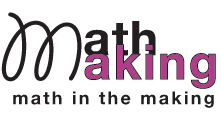Research Findings
The topics of the convening online and in-person discussions were wide ranging, highlighting the diversity of goals and perspectives represented by participants. Several themes that emerged from the process are highlighted below. For more details, see the project publications and resources.
(1) Balancing the goals of math engagement and making
The discussions surfaced a tension between (a) the value of highlighting the mathematics in making and tinkering experiences and (b) concerns about compromising the essential qualities of making as an agentive, unconstrained activity. A key question that emerged was how to promote math learning and reflection without detracting from the freedom inherent in authentic making experiences.
(2) Navigating negative perceptions of mathematics
Workshop participants discussed how making experiences, which have been shown to have broad appeal, could be leveraged to help change mindsets and beliefs about mathematics. On the other hand, negative attitudes present challenges to integrating mathematics and making, since participants might react differently to a making experience that they see as involving mathematics, or choose to disengage when the mathematics becomes central.
(3) Addressing issues of equity and diversity
During the workshop, several presenters discussed ways in which equity and diversity relate to the integration of math and making and highlighted the importance of understanding that making is not a new endeavor. Historically, many communities have engaged in making out of necessity, not as an extra-curricular hobby. Adopting a funds of knowledge perspective (González, Moll, & Amanti, 2005) requires that we discover and honor the mathematical and making skills that already exist in communities.
(4) Conceptualizing mathematics broadly
A broad view of math, including the many subfields of mathematics, mathematical reasoning, habits of mind, dispositions, and identities, is necessary in order to see and support opportunities for math in making. The mathematics most people have historically encountered in school provides a limited view of the topic’s potential richness, focusing mostly on numbers, computation, and solving equations. While the majority of project participants agreed with this broad definition, they also highlighted the challenges for non-mathematicians trying to identify the mathematical potential in a given making activity.
(5) Supporting educators and parents
The examples of math in making experiences shared during the workshop highlighted how successful integration often involves both activity design and skillful facilitation. To play this role well, educators and other adults, such as parents and caregivers, need targeted support—especially if they have narrow views of what constitutes mathematics based on their own school experiences.
